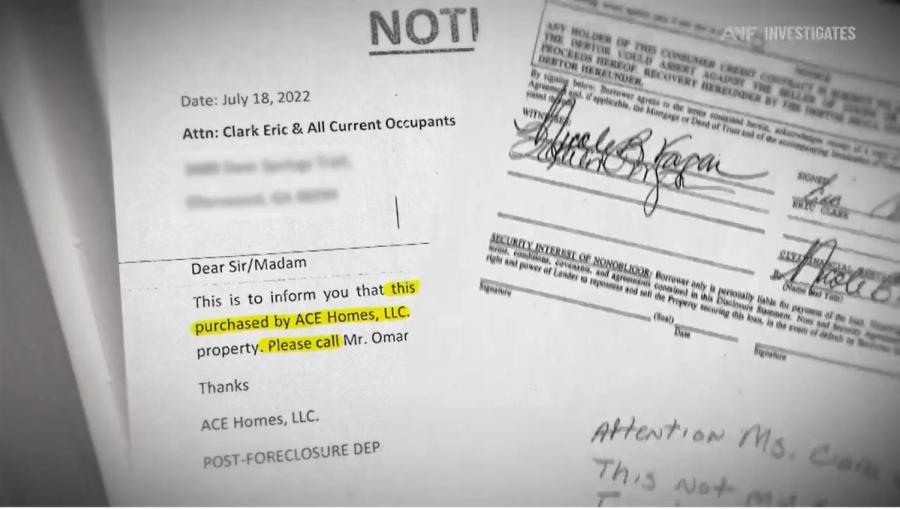
Eric Clark, 56, is a retiree and a dad who has owned his own home in DeKalb County’s Ellenwood community for more than 20 years.
Until now.
Last year, Clark received a letter dated July 18, 2022, that was left on his front door. It read, “This property has been foreclosed and purchased by Ace Homes LLC,” adding, in part, “call to discuss.”
“He said that he’s the new owner,” Clark recalled of his phone conversation.
Clark has records that appear to show he took out a second mortgage loan on the home. Those records show he never made payments, forcing a default which then led to foreclosure.
However, Clark said he never paid it because he never took out the loan. He alleges the second mortgage loan has his signature forged.
“I’ve never had a second mortgage, just bottom line,” Clark said. “I’m no fool. I know right from wrong,” adding he pays his bills on time.
The 56-year-old filed multiple Dekalb County police reports alleging this is a case of fraud. The reports obtained by Atlanta News First Investigates outline Clark telling police there were “fake documents to steal his house.” Citing, the realtor now wrongfully “has the deed to his home.”
“I’ve been stressed out,” Clark said. “I had to speak to a psychiatrist. I was just lost in the shuffle behind this.”
While Clark is fighting a battle in Dekalb County State Court, he’s also fighting health issues; he’s suffering from kidney failure, which requires dialysis three times a week.
A Dekalb County state court judge issued this judgment in Clark’s ongoing dispossessory case: “Claim of wrongful foreclosure is not a defense to dispossessory proceeding,” meaning, even if Clark believes there was fraud, if he doesn’t pay rent to the new homeowners, they have the right to evict him, even while he’s fighting a civil case.
“It’s painful and embarrassing more than anything.” Clark said, “to go out here and be my age and have to try to start over somewhere. That’s painful.”
Clark is not alone, said fair housing advocate John Fisher.
“My house was literally stolen,” Fisher told Atlanta City Council in a Sept. 5 meeting. “The issue is out of control.” Fisher said there are hundreds of similar but unrelated cases across metro Atlanta.
“They are creating documents that do not exist - in the form of a foreclosure deed or power of the deed - with the process, without any proof,” Fisher said.
The process Fisher described illustrates how easy it is to file paperwork with county clerks.
“Our hands are really tied,” said Annetta Danley Stembridge, Douglas County Clerk of Superior and State Court.
Under current Georgia law, clerks like Stembridge cannot require IDs from people when they come into the clerk’s office to file deeds, liens, or any other type of property paperwork.
“We cannot question people’s file,” she said.
So, it’s the honor system. Anyone can file documents on a home because as long as the paper appears legitimate and filled, “we have to accept it,” she said.
Stembridge recalls times families showed up to her office only to learn their home is no longer their home.
“It is a horrible feeling and just to see the looks on their faces.” Stembridge said. “You know, that the whole family’s inheritance gone down the drain. Somebody stole it.”
Stembridge points to Georgia’s statewide notification system that can help homeowners get ahead of any potential fraud. The tool alerts users whenever paperwork is filed against their property.
Meanwhile, some Georgia clerks want state law to change that would require identification to file any type of property paperwork. But even that wouldn’t solve the problem alone, according to David Maimon, an associate professor in the department of criminal justice and criminology at Georgia State University.
Maimon said dark web systems can easily duplicate many forms of identification, such as “fake driver’s licenses, fake birth certificates, fake social security cards and utility bills.”
He said the quality of fraudulent documents is so high that about 98 percent of the time, alleged scammers get away with producing, selling, buying and submitting false records.
Maimon, the director of Georgia State’s Evidence-based Cyber Security Group, said state offices need better technology at detecting fraudulent records. He said the quality of fraudulent documents is so high that about 98 percent of the time, alleged scammers get away with producing, selling, buying and submitting false records.
“We’re familiar with a very sophisticated supply chain,” Maimon said, adding, “it’s fairly easy.”
As for Clark, he now must pay a monthly rent of $2,409 or leave. “I don’t know what me and my son would do if I couldn’t pay the money,” he said.
Atlanta News First called and texted the realtor who left his contact information on Clark’s front door, he did not provide comment. However, the realtor’s attorney through ACE Homes LLC, the official new owner of Clark’s home, sent this statement:
“Judge Alvin Wong summarized the case, the facts, and the law, in the attached Order. This Judgment, and the other pleadings in DeKalb State Court action No. 23A01572, are all public record. Other than directing you to the public record, Ace Homes, LLC has no comment.”
As for allegations of property fraud, police are still investigating.
This content has been reproduced from its original source.